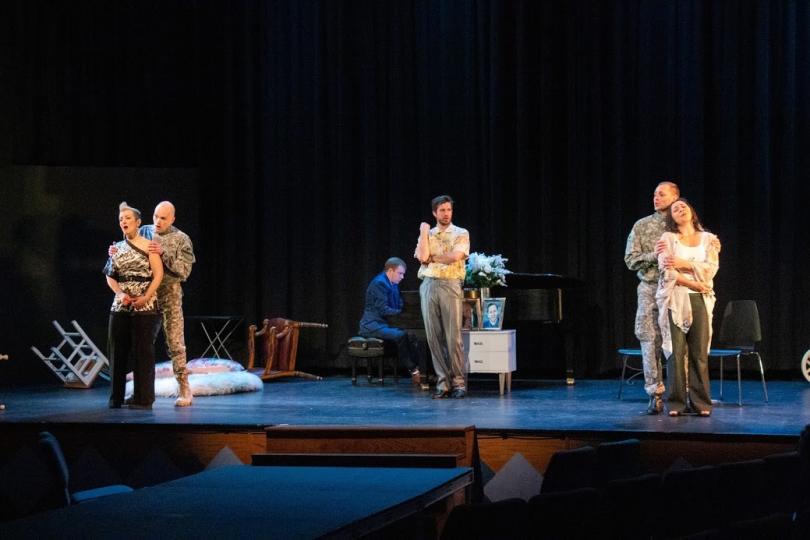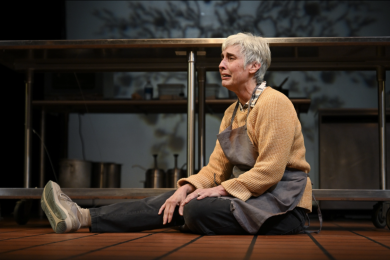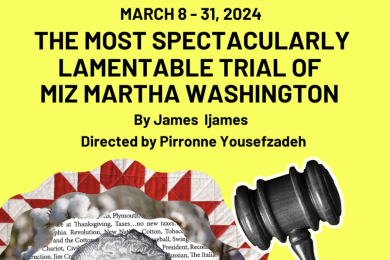Small stage, big laughs

The name Mozart, like Shakespeare, bears a certain weight. It has become synonymous with ‘perfection’ and elicits an expectation from most people who hear it. For some, that name commands excitement at the promise of a grandiose presentation. For others, it opens an invitation to zoom in on the small detail. It can provoke dread of having to listen to languages you don’t understand or dread at the idea of hearing yet another performance of pieces that have perhaps been done to death. Depending on the Mozart-ian baggage you carry around you may absolutely love or absolutely hate Skylark Opera Theatre’s production of Così fan tutte. For me and my experience, I loved it.
If you’re not familiar with this piece, it’s a frequently performed comedy that’s been around for 229 years and doesn’t show any signs of disappearing. The plot reminds me of some ‘90s teen movie where the jock bets his friends that their girlfriends wouldn’t noticed if they switched places with each other because girls are just like that. Crass as the fictional movie pitch is, it’s pretty darn close to the plot of this opera. The translation of “Così fan tutte” is “Women are like that”…basically ‘girls are all the same.’ I’ve seen this piece before on a very large operatic stage with; full orchestra, stunning scenery, and ornate costumes. In that setting, the piece feels impressive and grandiose and kind of weird. At its heart, this opera is silly and dressing it up with impressive production value kind of feels like entering a baby in a beauty pageant. Skylark’s production feels perfectly true to the show. In its minimalist style and contemporary English translation it offers the audience a chance to understand the subtlety of this piece for the absurd comedy that it is.
About 30 minutes deep in the first act I realized I had been smiling the entire time. These characters are just so fun to watch! They’re written as 100% clichés and there’s something so satisfying about watching actors bring out the humor of those tropes. We can see right through these characters, we’re smarter than them, we’re less frivolous, and it’s a treat to watch their karma come around. Replacing most of Mozart’s sung recitative for spoken dialog, these six actors essentially perform stand-up comedy between arias. Their balance of big characters with small nuance is a delight.
For me, the most captivating scene was Fiordiligi's aria: Per pietà, ben mio, perdona. As a very quiet scene with nowhere to hide we’re left with only the stage presence of Tess Altiveros for several minutes. Seeing this scene play out with no orchestra (only solo piano) and no perfect acoustics (the Historic Mounds Theatre is a lovely place but not an orchestral hall) I had to re-calibrate my expectations. I had to remind myself that opera isn’t inherently about being the most grandiose, but is inherently about hearing another human’s natural voice singing you a story. And once I got back in line with that expectation, Fiordiligi's aria hypnotized me.
Singing an Italian opera in English can be described as heroic or scandalous, depending on who you ask. In my opinion (which is not radical in this case), the original Italian is more pleasing to hear as an act of pure music but hearing the English sung allows a greater understanding of the story (than reading the translation). For me, each has a place. The translation used in this piece was done by Ruth and Thomas Martin who are probably the most prolific operatic translators of all time. Ruth Martin once said “The translator derives a great degree of satisfaction from helping to present an opera to American audiences in the way both the composer and his librettist intended, namely, as a drama set to music, which may be enjoyed without reference to the libretto in intermissions.” Her philosophy seems to align closely with that of Skylark Opera Theatre “…Committed to patron accessibility: all performances are in English, and are performed in intimate venues…”
Lastly, I’d like to note that Skylark is not alone in their work of presenting “high” art in pretty informal scenarios. I’m not an insider in the opera world but through performances and personal acquaintances I’ve become aware of opera in; bars (Opera on Tap), museums (Out of the Box Opera), and community centers (Arbeit Opera Theatre). I’m pretty fascinated by this trend… to not abandon the art form of opera nor to conform to its usual culture but to do whatever they damn well please with it. That’s something worth seeing. For Skylark’s production you’ve got one more weekend to get there.




